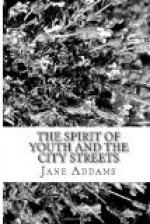Among the Hull-House neighbors are many of the Latin races who employ a careful chaperonage over their marriageable daughters and provide husbands for them at an early age. “My father will get a husband for me this winter,” announces Angelina, whose father has brought her to a party at Hull-House, and she adds with a toss of her head, “I saw two already, but my father says they haven’t saved enough money to marry me.” She feels quite as content in her father’s wisdom and ability to provide her with a husband as she does in his capacity to escort her home safely from the party. He does not permit her to cross the threshold after nightfall unaccompanied by himself, and unless the dowry and the husband are provided before she is eighteen he will consider himself derelict in his duty towards her. “Francesca can’t even come to the Sodality meeting this winter. She lives only across from the church but her mother won’t let her come because her father is out West working on a railroad,” is a comment one often hears. The system works well only when it is carried logically through to the end of an early marriage with a properly-provided husband.
Even with the Latin races, when the system is tried in America it often breaks down, and when the Anglo-Saxons anywhere imitate this regime it is usually utterly futile. They follow the first part of the program as far as repression is concerned, but they find it impossible to follow the second because all sorts of inherited notions deter them. The repressed girl, if she is not one of the languishing type, takes matters into her own hands, and finds her pleasures in illicit ways, without her parents’ knowledge. “I had no idea my daughter was going to public dances. She always told me she was spending the night with her cousin on the South Side. I hadn’t a suspicion of the truth,” many a broken-hearted mother explains. An officer who has had a long experience in the Juvenile Court of Chicago, and has listened to hundreds of cases involving wayward girls, gives it as his deliberate impression that a large majority of cases are from families where the discipline had been rigid, where they had taken but half of the convention of the Old World and left the other half.
Unless we mean to go back to these Old World customs which are already hopelessly broken, there would seem to be but one path open to us in America. That path implies freedom for the young people made safe only through their own self-control. This, in turn, must be based upon knowledge and habits of clean companionship. In point of fact no course between the two is safe in a modern city, and in the most crowded quarters the young people themselves are working out a protective code which reminds one of the instinctive protection that the free-ranging child in the country learns in regard to poisonous plants and “marshy places,” or of the cautions and abilities that the mountain child develops in regard to ice and precipices.




